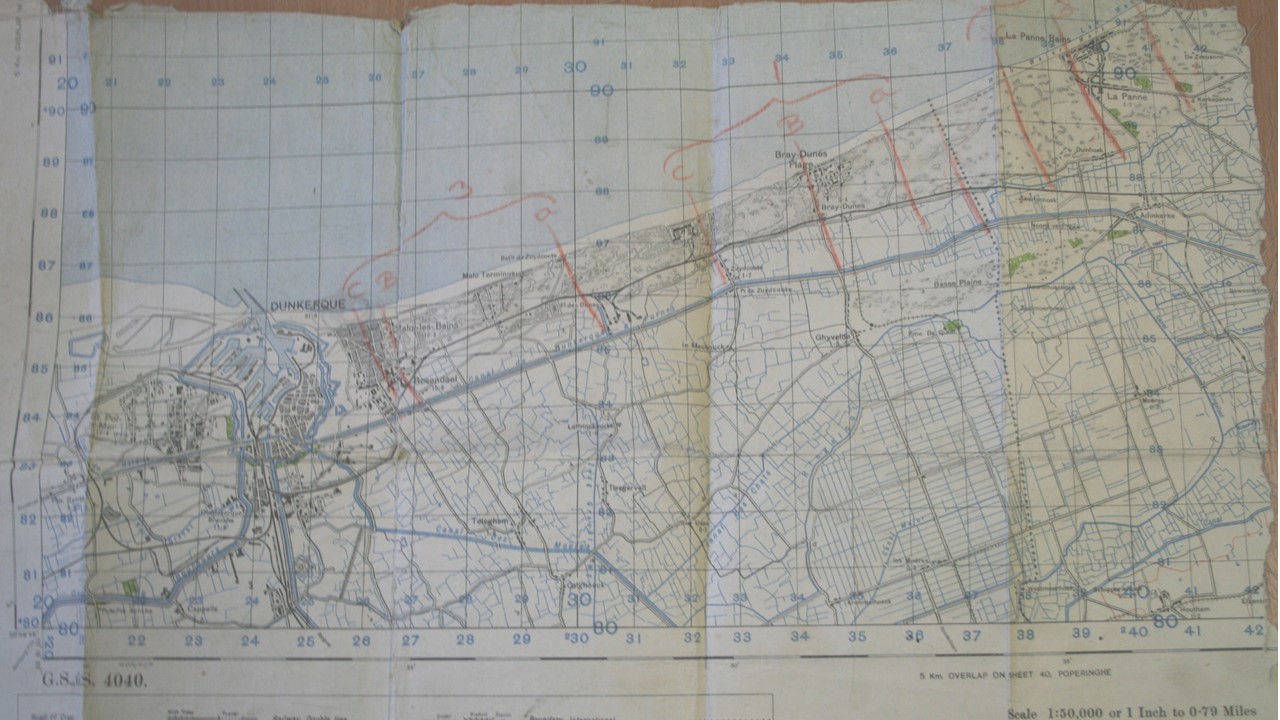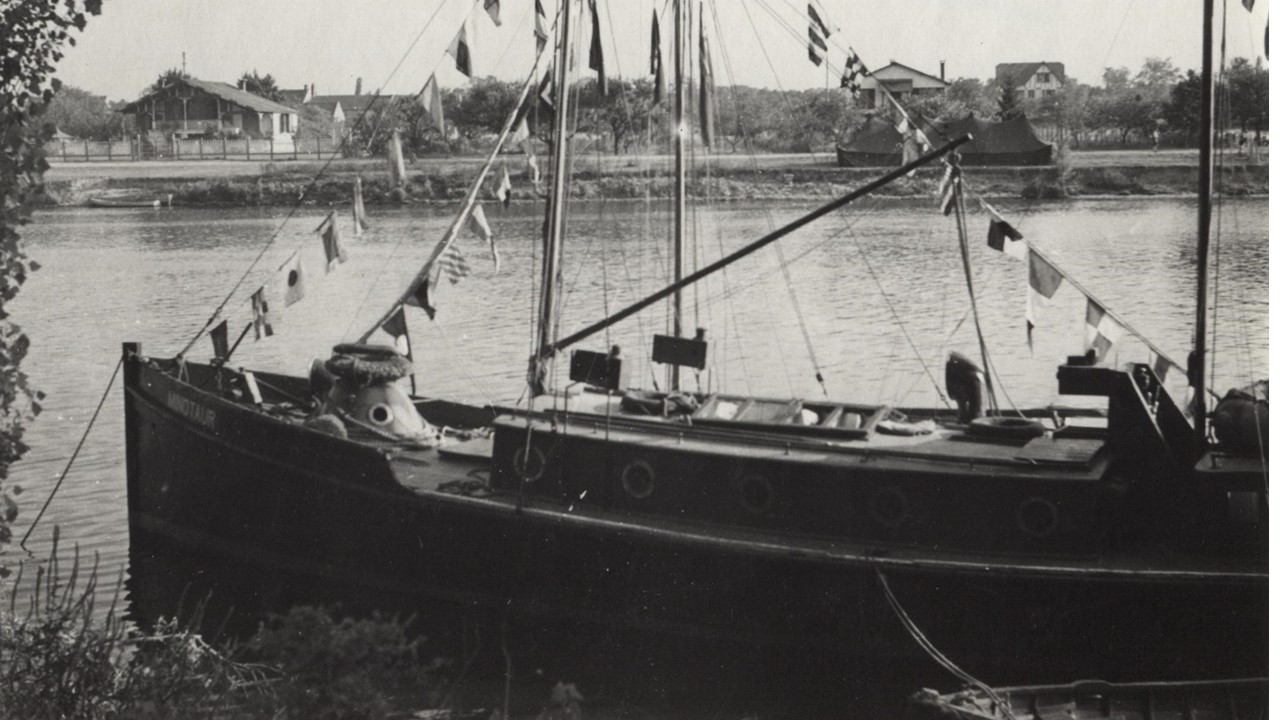Sea Scouts at Dunkirk
Few people realise that Sea Scouts played their part among ‘the little ships of Dunkirk’
Between 26 May and 4 June 1940, around 340,000 members of the British Army and their French and Belgian allies were evacuated from the beaches of Dunkirk on the coast of France.
Officially known as Operation Dynamo, the rescue mission saw hundreds of civilian owned boats pressed into service. They crossed the channel to help those stranded on the shore.
The operation has been immortalised in numerous films, including Darkest Hour (2017), Their Finest (2016), Dunkirk (1958, 2017) and Atonement (2007).
Despite such fame few people realise that Sea Scouts played their part among ‘the little ships of Dunkirk’.

Sea Scout rescue
The following extract was written for The Scouter, a predecessor to the later Scouting Magazine, in July 1940.
It was written by the Group Scout Leader of the Mortlake Sea Scout Group, who crewed the 45ft motor picket boat, ‘Minotaur’, during Operation Dynamo.
The Scout Leader is believed to be Mr Tom Towndrow. He received Admiralty orders on the night of 29 May to sail the Minotaur to a staging area in the Thames Estuary. There they waited on further instructions by the Royal Navy.
‘By midnight the Crew was found and, at 8.30am, we were underway down river, refuelling and taking on stores and water as we went. At 8pm, we reported to our destination and were given further instructions to proceed to a south-east port. We made it at 9am the next morning.
At Ramsgate, two Naval ratings joined the Minotaur crew and assisted with the loading of fuel and provisions. They all received detailed operational instructions on the morning of 31 May, before making the crossing to Dunkirk, and would have had little knowledge of what they would encounter.
By 10.45 am, we were on our way. The crossing took five-and-a-half to six hours, and was by no means uneventful. Destroyer after destroyer raced past, almost cutting the water from beneath us, and threatening to overturn us with their wash. We approached the beach with great caution at Dunkirk, because of the wrecks. We found things fairly quiet, and got on with our allocated job of towing small open ships’ boats, laden with soldiers, to troop transports anchored in deep water, or of loading our ship from the open boats and proceeding out to the transports.
Conditions didn’t remain quiet for long. We were working about a quarter of a mile away from six destroyers. Suddenly, all their anti-aircraft guns opened fire. At the same time, we heard the roar of 25 Nazi planes overhead. Their objective was the crowded beach and the destroyers. A succession of bombs were dropped. Adding to the deafening noise were air raid sirens sounding continuously on the shore. One ‘plane made persistent circles round us. Another Nazi ‘plane was brought down in flames, far too close for our liking!
After the raiders had passed, we shakily got on with the job. Eventually, our fuel ran low and the engine made ominous noises, so we were relieved from our duty. We took a final load to a trawler, returned to our East Coast base, re-fuelled and turned in for a few hours’ sleep. We were then told to stand by, as fast boats were making the next crossing.
We shipped aboard another motorboat as crew. We left before it got dark, under convoy of a large sea-going tug. Our job this time was to work from the mole at Dunkirk Harbour in conjunction with the tug. The operation was supposed to be carried out under cover of darkness, but with the petrol and oil tanks on fire it might have been daytime. Having loaded the tug, we came away barely in time. As we left the mole, the Germans got its range and a shell demolished the end of it.
On the way back, we Scouts transferred to a Naval cutter that was making the return journey and full of troops. The officer in charge had lost his charts. Knowing the course back, we were able to take over. After a nine-hours’ crossing, we made our East Coast base once more. German aircraft constantly followed all small boats out to sea, gunning the crews and troops on board. Three more members of our Sea Scout Troop crewed other boats from Chiswick that were short of men.’

A soldier’s reflections
In August 1940, The Scouter published another perspective on the evacuation. It was that of a London Scout volunteer who had been evacuated from the beaches.
‘A gun-crew drove their lorry and gun on to the sands to make their last stand and decided they had no more use for the lorry. They unhitched the gun and, rather than let the Jerries’ have the lorry, decided to drive it into the sea. The driver climbed into the cab, started her up, drove her towards the sea and on reaching the water’s edge, jumped out. The lorry continued on its way for a few yards, decided it didn’t like the cold water, turned on its own volition, and came back to dry land. This performance was enacted three times before the lorry was at last well and truly launched. Was there a higher power directing the course of this strange vehicle? Would we have found further uses for it had we kept it by us? Who can tell?
Our camp commandant (a major) was the real old-fashioned type-a bullying, blustering fellow whose voice made us tremble in our shoes. That first afternoon on the sands was terrible. We’d marched quite a few miles, and very little food or sleep, and he was in exactly the same condition as ourselves. He found an old truck and drove off in it. Time passed-German bombers paid rather a long visit, bombing and machine-gunning ships in the bay and the soldiers on the beach. Where could the Major have gone? Had he left us to our fate and was he trying to save his own skin? We were vaguely uneasy. He had set off in the direction of what had once been the town of Dunkirk, but was now a shambles of bricks, mortar, girders, and broken glass. The raids in the afternoon had started more fires; he couldn’t possibly get through. We were getting rather desperate when a voice said, “The truck!” Oh, magic words! A weight lifted from my mind, for there was the old boy still driving although he must have been ready to sleep at the wheel; but what was that in the lorry?-tea, sugar, canned milk, bully beef, and biscuits. What a meal we had-no, it wasn’t a meal, it was a banquet, for we hadn’t had tea for days, or was it weeks? We had lost track of the days, driving, snatching an hour’s sleep when possible, which wasn’t at all often, marching, or rather staggering, along unending roads, diving into ditches to escape shrapnel and machine-gun bullets. What matter though there was a foot of water in some of the ditches; anything was better than the open road when enemy planes were overhead.
But you have read all about that in the newspapers. What you haven’t read about was that wonderful glimpse of calm, peaceful English countryside as we sped along in a train. What is there in an old lady standing in the door of her cottage waving to the soldiers from Dunkirk passing in a troop train that makes a lump come into the throat and makes you feel you could cry like a kid?’